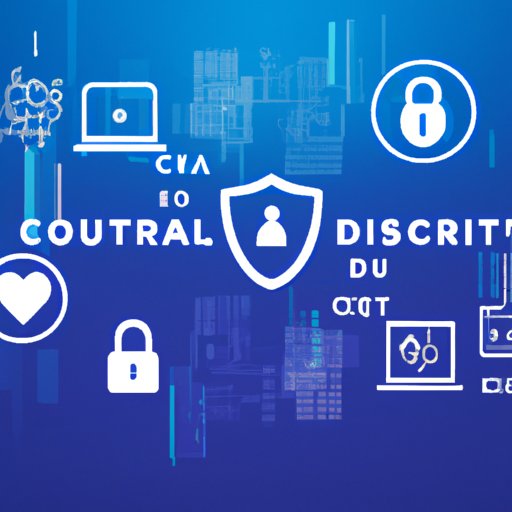Introduction
Cybersecurity is a term used to refer to the practices and technologies that are employed to protect digital systems, networks, and data from unauthorized access and malicious attacks. In today’s world, where technology has become integral to our lives and businesses, cybersecurity is more important than ever. Businesses of all sizes need to take the necessary steps to protect their data and systems from cyber threats.

Consequences of a Data Breach
A data breach is a security incident that results in the unauthorized access of sensitive information. This could be anything from customer credit card numbers to employee social security numbers. The consequences of a data breach can be severe for businesses, both financially and reputationally.
According to a study by IBM Security and the Ponemon Institute, the average cost of a data breach for companies worldwide was $3.86 million in 2020. The report also found that the cost of a data breach had increased by 12% since 2019.
In addition to financial losses, a data breach can have serious repercussions on a company’s reputation and brand image. According to research conducted by the University of Maryland, customers are less likely to do business with a company that has experienced a data breach. Furthermore, the study found that customers who have been affected by a data breach are more likely to switch to a competitor.
Compliance with Regulatory Standards
Businesses must comply with a variety of regulations when it comes to handling data. Some of the most important regulations include the General Data Protection Regulation (GDPR), Payment Card Industry Data Security Standard (PCI DSS), and Health Insurance Portability and Accountability Act (HIPAA). Failing to comply with these regulations can result in hefty fines and other penalties.
The GDPR requires organizations to protect the personal data of EU citizens by implementing appropriate technical and organizational measures. This includes encrypting data, ensuring secure storage, and implementing access control mechanisms. Organizations must also notify the relevant authority within 72 hours if they suffer a data breach.
The PCI DSS is a set of security standards designed to ensure the safe handling of payment card data. Organizations must implement various security measures, including encrypting data, using multi-factor authentication, and regularly testing their systems.
The HIPAA sets out strict requirements for safeguarding the privacy and security of protected health information. Organizations must implement appropriate administrative, physical, and technical safeguards to protect patient data.

Cost Savings of Investing in Cyber Security
Investing in cybersecurity can help businesses save money in the long run. For example, adopting effective security measures can reduce the risk of data loss, which can lead to improved efficiency and reduced insurance premiums. Additionally, investing in cybersecurity can help businesses avoid costly fines for non-compliance with regulations.
Research conducted by the Ponemon Institute found that companies that invested in effective security measures saved an average of $1.2 million after suffering a data breach. Furthermore, the study found that companies that had an effective security strategy in place were able to detect data breaches more quickly, reducing the cost of the breach.
Protection of Customer Data
Organizations must take steps to protect customer data from hackers and other malicious actors. This can include implementing robust encryption techniques, requiring multi-factor authentication, and using firewall and anti-virus software. Organizations must also ensure that customer data is securely stored and only accessed by authorized personnel.
Encryption is a process of transforming data into an unreadable form so that it cannot be accessed without the correct decryption key. Encryption helps protect data from unauthorized access, even if it falls into the wrong hands. Organizations should use strong encryption algorithms and ensure that the encryption keys are securely stored.
Authentication is the process of verifying a user’s identity before granting them access to a system or data. Organizations should require multi-factor authentication, which requires the user to provide two or more pieces of evidence to prove their identity. This could include something they know (such as a password), something they have (such as a token or code), or something they are (such as their fingerprint).
Firewall and anti-virus software can help protect networks and systems from malicious attacks. Firewalls act as a barrier between the internal network and the internet, while anti-virus software can detect and remove malicious software from computers and networks.
Benefits of Having an Effective Cyber Security Strategy
Having an effective cybersecurity strategy can bring numerous benefits to businesses. It can increase customer confidence, improve productivity, and enhance business growth. It can also help businesses stay compliant with regulatory standards and avoid costly fines for non-compliance.
According to a study by the Ponemon Institute, customers are more likely to trust companies that have implemented effective security measures. The study found that customers who felt their data was secure were more likely to purchase from the company and recommend it to others.
An effective cybersecurity strategy can also improve employee productivity. Research conducted by the Harvard Business Review found that employees who felt their data was secure were more productive, as they did not have to worry about the security of their data.
Finally, an effective cybersecurity strategy can help businesses grow. Customers are more likely to trust businesses that take security seriously, and this can lead to increased sales and revenue. Additionally, businesses can reduce their costs by avoiding costly fines for non-compliance with regulatory standards.
Conclusion
Cybersecurity is an essential component of any modern business. Investing in effective security measures can help protect businesses from costly data breaches and ensure compliance with regulatory standards. Additionally, it can help businesses save money, protect customer data, and benefit from increased customer confidence, improved productivity, and enhanced business growth.
(Note: Is this article not meeting your expectations? Do you have knowledge or insights to share? Unlock new opportunities and expand your reach by joining our authors team. Click Registration to join us and share your expertise with our readers.)
